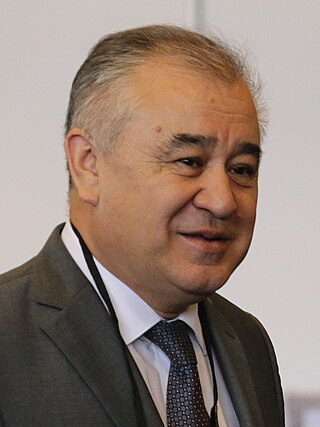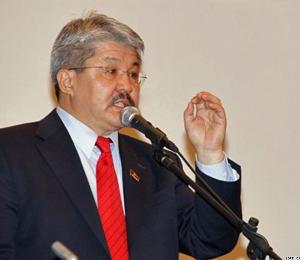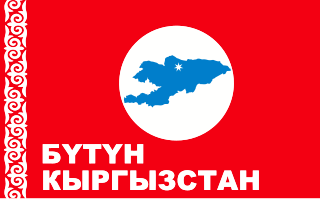
The history of the Kyrgyz people and the land now called Kyrgyzstan goes back more than 3,000 years. Although geographically isolated by its mountainous location, it had an important role as part of the historical Silk Road trade route. Turkic nomads, who trace their ancestry to many Turkic states such as the First and Second Turkic Khaganates, have inhabited the country throughout its history. In the 13th century, Kyrgyzstan was conquered by the Mongols; subsequently it regained independence but was invaded by Kalmyks, Manchus, and Uzbeks. In 1876, it became part of the Russian Empire, remaining in the USSR as the Kirghiz Soviet Socialist Republic after the Russian Revolution. Following Mikhael Gorbachev's democratic reforms in the USSR, in 1990 pro-independence candidate Askar Akayev was elected president of the SSR. On 31 August 1991, Kyrgyzstan declared independence from Moscow, and a democratic government was subsequently established.

The politics of Kyrgyzstan, officially known as the Kyrgyz Republic, takes place in the framework of a presidential system representative democratic republic, whereby the President is head of state and the Chairman of the Cabinet of Ministers is head of government. Executive power is exercised by the government. Legislative power is vested in both the government and parliament. The Economist Intelligence Unit rated Kyrgyzstan an "authoritarian regime" in 2022.

Kyrgyzstan elects on the national level a head of state – the president – and a legislature. The president is elected for a tenure of single six-year term by the people. The Supreme Council is composed of 120 members filled by proportional representation.

Felix Sharshenbayevich Kulov is a Kyrgyz politician who served as the 9th Prime Minister of Kyrgyzstan from 2005 to 2007, following the Tulip Revolution. He first served from 1 September 2005 until he resigned on 19 December 2006. President Kurmanbek Bakiyev reappointed him acting Prime Minister the same day, but parliamentary opposition meant Bakiyev's attempts to renominate Kulov in January 2007 were unsuccessful, and on 29 January the assembly's members approved a replacement.

Kurmanbek Saliyevich Bakiyev is a Kyrgyz politician who served as the second president of Kyrgyzstan, from 2005 to 2010. Large opposition protests in April 2010 led to the takeover of government offices, forcing Bakiyev to flee the country.

Omurbek Chirkeshovich Tekebayev is a Kyrgyz politician. He was Speaker of the Kyrgyz Parliament from March 2005 to March 2006. Tekebaev is the leader of the Ata-Meken socialist party. Currently, he serves as the ambassador of the Kyrgyz Republic to Germany.

The Social Democratic Party of Kyrgyzstan was a centre-left political party in Kyrgyzstan. The SDPK was one of the oldest and largest political parties in the country. The party took an active part in the Tulip Revolution and the 2010 Revolution. The party's members included three presidents of Kyrgyzstan: Roza Otunbayeva, Almazbek Atambayev and Sooronbay Jeenbekov.

The Ata-Meken Socialist Party is a social-democratic political party in Kyrgyzstan. Its current Chairman and founder is Omurbek Tekebayev, who is a former speaker of the Kyrgyz Parliament. The party was registered on December 16, 1992, following a split between Tekebayev and the conservative Erkin Kyrgyzstan party. Ata-Meken eventually moved into the centre-left of the political spectrum.

The Supreme Council of Kyrgyzstan, known as the Jogorku Kengesh, is the unicameral parliament of the Kyrgyz Republic. Before Kyrgyzstan's independence from the Soviet Union in 1991, it was known as the Supreme Soviet of the Kirghiz Soviet Socialist Republic.

A constitutional referendum was held in Kyrgyzstan on 21 October 2007, following the constitutional crisis caused by amendments passed since the Tulip Revolution in 2005 being invalidated by the Constitutional Court of Kyrgyzstan on 14 September 2007. Voters were asked whether questions on a new constitution and electoral law. Both were approved by over 95% of voters.

Bakyt Beshimov is a leader of parliamentary fraction and deputy chairman of Social Democratic Party of Kyrgyzstan. Bakyt Beshimov is a prominent opposition leader, famous for his liberal views, and speaking out against Kurmanbek Bakiyev's and Askar Akayev's regimes.

Presidential elections were held in Kyrgyzstan on 23 July 2009. The date was set after the constitutional court ruled that the extension of the presidential term from four to five years did not apply until the next presidential election, calling for elections by 25 October 2009; in response, a parliament committee proposed the July election date, which was then passed by the incumbent president Kurmanbek Bakiyev's Ak Jol-dominated parliament. Bakiyev had previously announced his intention to run for reelection. Bakiyev was re-nominated on 1 May 2009.
United People's Movement is a coalition currently active in Kyrgyzstan. The coalition was formed in December, 2008 as an umbrella group representing various factions in opposition to Kyrgyz President Kurmanbek Bakiyev, and includes parties such as Ata Meken, Ak Shumkar, Asaba and Jany Kyrgyzstan, as well as the Social Democrats – which is the only party represented in parliament besides the ruling, and pro-Bakiyev, Ak Zhol.

Early parliamentary elections were held in Kyrgyzstan on 10 October 2010. All 120 seats of the Supreme Council were elected by the party list system. Seats were allocated to all parties who obtained more than 5% of the vote overall and more than 0.5% in each of the nine provinces, capped at 65 seats per party.

Ata-Zhurt is a political party in Kyrgyzstan. Its political base is in the south of the country, but the party is headquartered in the capital, Bishkek. In 2014, it merged with the Respublika party to create Respublika–Ata Zhurt, but the two parties ended up splitting again four months before the parliamentary elections of 2020, in which Ata-Zhurt instead formed a joint list with Mekenim Kyrgyzstan. After the results of that vote were annulled, Ata-Zhurt contested the 2021 elections independently and came in first with 19% of the vote. The party is led by Kamchybek Tashiyev, and has previously supported the ousted former President Kurmanbek Bakiyev.

Bakyt Ergeshevich Torobayev is a Kyrgyz politician who has been the leader of the Onuguu-Progress party since 2013.

United Kyrgyzstan is a nationalist political party in Kyrgyzstan founded in 2010. It is generally more popular in the south of the country. The party is led by Adakhan Madumarov, who unsuccessfully ran for president of Kyrgyzstan in 2011 and 2017, coming second and third, respectively. It holds an ethnic nationalist ideology and supports a presidential system of government. The party was originally created to support Kyrgyz migrant laborers in Russia. The party won its first seats in the Supreme Council in the October 2020 parliamentary election, which was subsequently annulled. The party passed the 3% threshold in the 2021 parliamentary election and therefore is represented in the national legislature.

Parliamentary elections were held in Kyrgyzstan on 4 October 2020. The results showed that pro-government parties had won a supermajority of seats. The election was subsequently annulled by the Central Election Commission during the 2020 Kyrgyzstan protests.

Birimdik officially the Party of Democratic Socialism—Eurasian Choice "Birimdik" is a pro-Jeenbekov political party in Kyrgyzstan, founded in 2005 as the Birimdik Democratic Party. On May 8, 2013 it was registered with the current name. The party includes many former officials and deputies.

Snap parliamentary elections were held in Kyrgyzstan on 28 November 2021. They followed the annulment of the results of the October 2020 elections and the subsequent protests against the election's conduct. Six parties passed the 5% threshold needed to win seats in the parliament. Turnout hit a record low at less than 35%.
















